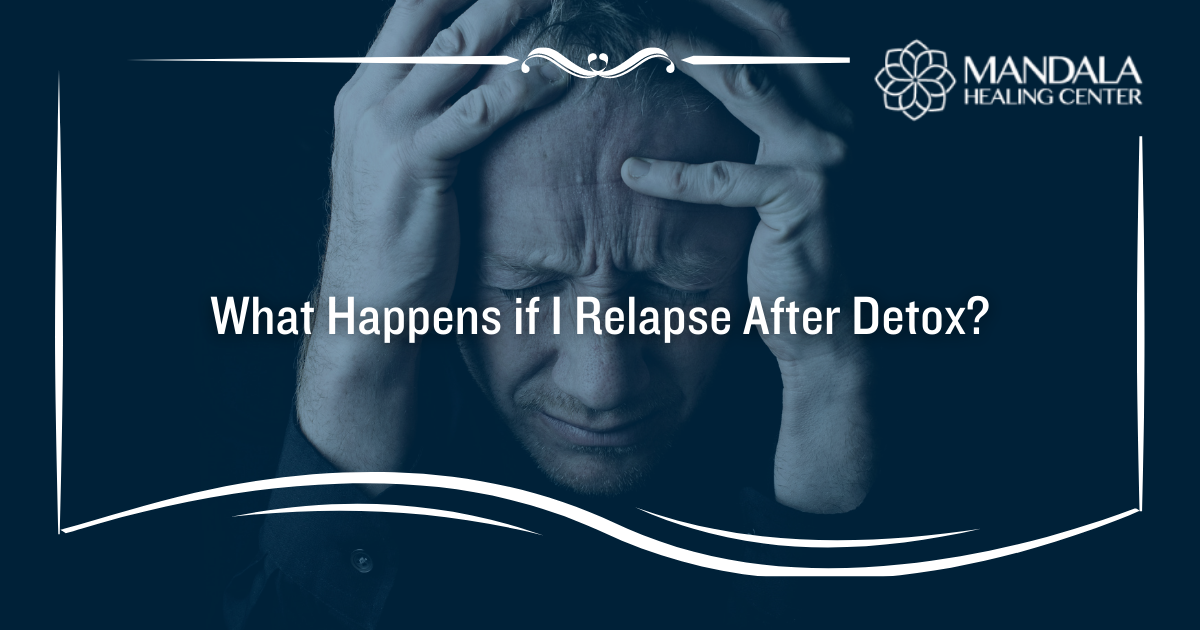When you finish detox, you may feel a range of emotions. You might feel excited to start the rest of your life, anxious about how things will be now that you’re sober, or some combination of confident and unsure. Many people leave detox with the belief that their life will be perfect, or will at least return to normal, but detox is only the beginning of the recovery process. After all, detox only addresses the physical symptoms of addiction.
The realization that there are still challenges, problems, and setbacks may cause people to feel disappointed. Sometimes, cravings and minor withdrawal symptoms are still there. These challenges can cause people to relapse after detox, especially if they did not complete a treatment program. Relapsing is very common–research suggests between 40-60% of people who complete an addiction treatment program will have at least one relapse in their life.[1]
While relapsing is common, it can also feel like a failure. This idea does not contribute to lifelong sobriety. Instead of viewing a relapse as a failure, you can instead think of it as part of the process of recovery. Find out what you can learn from it, recommit to recovery, and make a new plan for avoiding another relapse in the future.
What is Life Like After Detox?
Detox is only the first step in the lifelong process of recovery from addiction. Many people have challenges right after leaving drug and alcohol detox and are not prepared to live independent, sober lives. Others may still have lingering physical symptoms of withdrawal. Many people experience long-lasting discomfort associated with withdrawal, including:
- Fatigue
- Poor concentration
- Sleep issues, such as insomnia
- Anxiety
- Depression
- Loss of appetite
- Irritability
Post-Acute Withdrawal Syndrome (PAWS) can last for weeks or months, depending on the length and severity of your addiction. While it is frustrating and uncomfortable, PAWS is just a phase that will pass with time.[2] If people are not expecting to experience PAWS, they may struggle with disappointment or begin using substances to help them cope with their symptoms.
In addition to physical symptoms, people may find it difficult to cope with difficult emotions or relationships that were strained before they sought treatment. It is easy to assume that all your relationships will be better after you get treatment, but this is not often the case. These combined factors make relapses after detox fairly common.
What Can Cause a Relapse After Detox?
While you might hope that going through detox will be the end of your addiction, this is generally not the case. There are many reasons someone may have a relapse after finishing detox. These include:
- Not spending enough time in detox or treatment
- Lack of social support
- Exposure to triggers–especially people who are using drugs or drinking
- Not enough coping skills
- No relapse prevention plan
- Chronic stress
- Ongoing physical symptoms of withdrawal
- Feelings of disappointment or failure
- Guilt or shame
- Quitting for others–feelings of ambivalence about sobriety
It is important to treat detox as only the first step of recovering from addiction. You must commit to lifelong sobriety and create a plan to keep you focused and on track. Social support is a crucial aspect of avoiding a relapse after detox.
What to Do After a Relapse
After a relapse, your first response might be to blame yourself or give up on your goal of lifelong sobriety. You must avoid seeing a relapse as a failure. It is not a failure. Instead, think of a relapse as a sign that you might need more time in treatment or more support in the community. If you have completed a detox or treatment program, make a plan for how you will handle a relapse. This could include:
- Going to treatment: Make a plan that includes how you will go to treatment if needed. After a relapse, get in touch with your treatment team and let them know you need ongoing treatment.
- Consider a sober living community: Many people struggle with the transition between detox or treatment and home. Spending some time living in a sober living community offers the chance to practice “real life” while surrounded by other people in recovery.
- Engage in the recovery community: Join a support network or get involved with an alumni group.
- Stay in therapy: Continue to attend group or individual therapy sessions. Be open with your therapist about your relapse.
- Self-care: Eat nutritious meals regularly. Find movement that feels good. Take breaks when you can. Engage in hobbies. It can be tempting to give up on self-care out of shame or disappointment, but you deserve to treat yourself well and find ways to care for your body, mind, and spirit.
Learn The Skills You Need to Prevent a Relapse After Detox
If you or someone you love requires support after a relapse or to avoid one, reach out to the staff at the Mandala Healing Center. We offer a range of comprehensive addiction treatment programs that are designed to support people in any stage of addiction or recovery.
Do not wait another day for the life-changing treatment you deserve. Call today to speak to one of our compassionate staff members.
References:
- https://www.drugabuse.gov/publications/drugs-brains-behavior-science-addiction/treatment-recovery
- https://www.semel.ucla.edu/dual-diagnosis-program/News_and_Resources/PAWS













